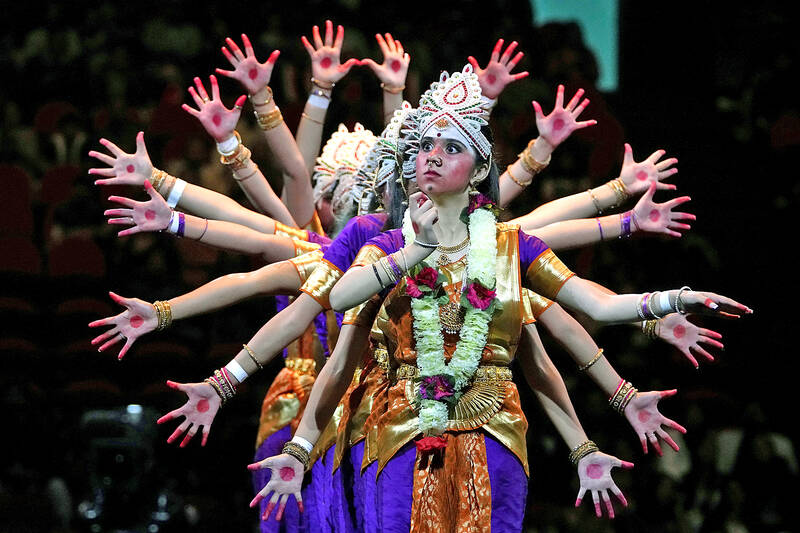Australia yesterday offered Indian Prime Minister Narendra Modi a rock-star welcome, lavishing praise on the Indian leader during a visit heavy on trade and light on criticism.
Modi held a campaign-style rally at a 21,000-capacity Sydney arena, with Australian Prime Minister Anthony Albanese playing emcee.
Lured by the world’s most populous market and a counterweight to China’s growing military, diplomatic and economic clout, the Australian government is layering on the charm.

Photo: AP
To chants of “Modi, Modi, Modi,” Albanese introduced his “dear friend” to a jazzed-up crowd of Indian-Australians, who he praised for making Australia “stronger and more inclusive.”
“The last time I saw someone on the stage here was Bruce Springsteen and he didn’t get the welcome that Prime Minister Modi has got,” Albanese said.
“Prime Minister Modi is the boss,” he said, breaking into a broad smile and boasting the pair had met six times in the past year.
It was an unusually personal show of support for Modi, a nationalist leader who faces re-election next year and has been criticized for democratic backsliding and discrimination against India’s non-Hindus.
Modi reciprocated his host’s praise, offering a long list of interests that bind the two nations — from cricket to curry, yoga to MasterChef.
“The most important foundation of our ties is mutual trust and mutual respect,” he said.
Modi on Monday started his first visit to Australia since 2014, his first year in office.
Behind the flattery and mutual backslapping lie some hardheaded strategy and politics. As Australia struggles with a more assertive China, it is looking for economic and political partners in an increasingly rough-and-tumble neighborhood.
India’s economic performance has been mixed in the past decade, with missteps curbing growth, but hundreds of millions have been lifted out of poverty. It is now the second-fastest growing economy in the G20 and a multitrillion-dollar market, and for both Modi and Albanese, the Indian diaspora offers a rich font of votes and campaign donations, said Ian Hall, an international relations professor at Brisbane’s Griffith University.
“What we saw with this joint appearance in Sydney is an intermingling of Australian and Indian domestic and foreign policy,” Hall said. “Both leaders are looking for funds and support, with the Indian diaspora center stage, and using the bilateral partnership almost as leverage.”
Indian-Australians make up the nation’s fastest-growing and second-largest diaspora, with 673,000 Indian-born citizens in a population of 26 million.
However, Albanese’s warm embrace of Modi has raised questions, too.
Under Modi “the world’s largest democracy” has become less free and more dangerous for his critics, Human Rights Watch’s Elaine Pearson said.
“Modi’s Bharatiya Janata Party-led government has been tightening its grip on civil society, using draconian laws to arrest and intimidate activists, journalists, opposition leaders, academics, peaceful protesters and critics of government policies,” Pearson said.

The Taiwanese passport ranked 33rd in a global listing of passports by convenience this month, rising three places from last month’s ranking, but matching its position in January last year. The Henley Passport Index, an international ranking of passports by the number of designations its holder can travel to without a visa, showed that the Taiwan passport enables holders to travel to 139 countries and territories without a visa. Singapore’s passport was ranked the most powerful with visa-free access to 192 destinations out of 227, according to the index published on Tuesday by UK-based migration investment consultancy firm Henley and Partners. Japan’s and

NATIONAL SECURITY THREAT: An official said that Guan Guan’s comments had gone beyond the threshold of free speech, as she advocated for the destruction of the ROC China-born media influencer Guan Guan’s (關關) residency permit has been revoked for repeatedly posting pro-China content that threatens national security, the National Immigration Agency said yesterday. Guan Guan has said many controversial things in her videos posted to Douyin (抖音), including “the red flag will soon be painted all over Taiwan” and “Taiwan is an inseparable part of China,” while expressing hope for expedited “reunification.” The agency received multiple reports alleging that Guan Guan had advocated for armed reunification last year. After investigating, the agency last month issued a notice requiring her to appear and account for her actions. Guan Guan appeared as required,

Japan and the Philippines yesterday signed a defense pact that would allow the tax-free provision of ammunition, fuel, food and other necessities when their forces stage joint training to boost deterrence against China’s growing aggression in the region and to bolster their preparation for natural disasters. Japan has faced increasing political, trade and security tensions with China, which was angered by Japanese Prime Minister Sanae Takaichi’s remark that a Chinese attack on Taiwan would be a survival-threatening situation for Japan, triggering a military response. Japan and the Philippines have also had separate territorial conflicts with Beijing in the East and South China

A strong cold air mass is expected to arrive tonight, bringing a change in weather and a drop in temperature, the Central Weather Administration (CWA) said. The coldest time would be early on Thursday morning, with temperatures in some areas dipping as low as 8°C, it said. Daytime highs yesterday were 22°C to 24°C in northern and eastern Taiwan, and about 25°C to 28°C in the central and southern regions, it said. However, nighttime lows would dip to about 15°C to 16°C in central and northern Taiwan as well as the northeast, and 17°C to 19°C elsewhere, it said. Tropical Storm Nokaen, currently